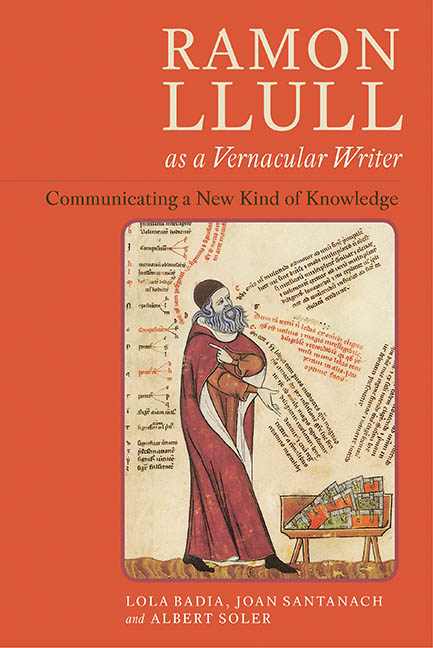Book contents
- Frontmatter
- Dedication
- Contents
- Illustrations
- Acknowledgements
- Abbreviations
- Introduction
- 1 Ramon Llull's Art, Language, and Literary Expression
- 2 Style and Genre in the Writings of Ramon Llull
- 3 The Composition and Dissemination of Ramon Llull's Texts, from Script to Print
- 4 Ramon Llull's Vernacular Context
- Epilogue. Ramon Llull's OEuvre as a Whole: Autobiographism and Self-Referentiality
- Appendix 1 First-Generation Llullian Manuscripts
- Appendix 2 Catalan Language and Literature in Relation to Ramon Llull
- Bibliography
- Index
4 - Ramon Llull's Vernacular Context
Published online by Cambridge University Press: 05 June 2016
- Frontmatter
- Dedication
- Contents
- Illustrations
- Acknowledgements
- Abbreviations
- Introduction
- 1 Ramon Llull's Art, Language, and Literary Expression
- 2 Style and Genre in the Writings of Ramon Llull
- 3 The Composition and Dissemination of Ramon Llull's Texts, from Script to Print
- 4 Ramon Llull's Vernacular Context
- Epilogue. Ramon Llull's OEuvre as a Whole: Autobiographism and Self-Referentiality
- Appendix 1 First-Generation Llullian Manuscripts
- Appendix 2 Catalan Language and Literature in Relation to Ramon Llull
- Bibliography
- Index
Summary
Difference, concordance and contrariety are the three relational principles from the green triangle of Figure T as used in Llull's Art. In the current chapter they will serve as reference points for exploring and evaluating the place one can assign to Ramon Llull within his most immediate cultural and literary context as a vernacular writer.
As we showed in the Introduction (pp. 27–35), having recourse to a broad notion of vernacularity leads one to confront the figure of Ramon Llull by way of a complex set of interrelated phenomena which does not lend itself easily to definition, yet enjoys greater scope than do the conventional means of approaching his person and his oeuvre. In the preceding chapters we have mentioned various figures and cultural artefacts, ancient and contemporary, which have served as contrasts or starting-points for the presentation of specific aspects of the life and work of Ramon Llull. We have referred to the troubadour Cerverí de Girona and the Dominican friar Saint Raymond of Penyafort, for instance, both of whom were subjects of James I of Aragon, King of Majorca at the time Ramon Llull was born; here we shall survey the differences and affinities between Llull and such contemporary figures, as well as between him and other close and significant counterparts.
Two University Masters: Raymond of Penyafort and Ramon Martí
It is Ramon Llull himself who mentions Raymond of Penyafort – and we know that the names of historical figures are scarce in Llull's oeuvre. In the Vita coaetanea [A Contemporary Life] this Dominican intellectual appears as the individual responsible for the personal orientation of the studies Llull undertook in Majorca from 1265 onwards, when he shelved, for the time being, his plans to go to Paris:
But he was dissuaded from making this trip [to Paris] by the arguments and advice of his relatives and friends and most of all of Brother Ramon of the Dominicans, who had formerly compiled the Decretals for Pope Gregory IX.
(Llull 2010b: 37–9)We have no reason to doubt the authenticity of the involvement of the highest juridical authority of the time in a biographical episode which would determine the future development of Llull's career, and which should be situated in Barcelona, probably in 1264.
- Type
- Chapter
- Information
- Ramon Llull as a Vernacular WriterCommunicating a New Kind of Knowledge, pp. 227 - 264Publisher: Boydell & BrewerPrint publication year: 2016



